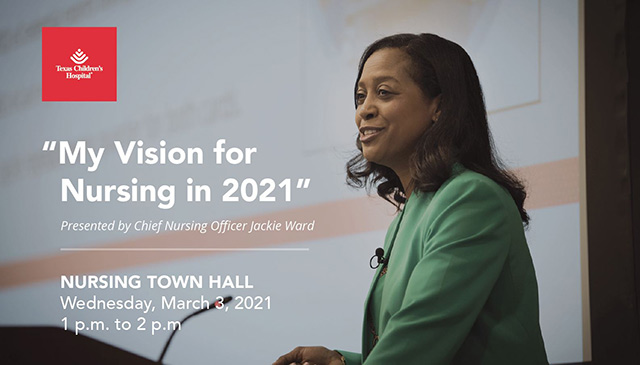As we continue to celebrate Social Work Month, Texas Children’s Social Worker Ver’Tanya Jack shares why she chose to receive the COVID-19 vaccine and how she felt after receiving it.

Amid the ongoing pandemic, historic winter weather, political divisions and the twists and turns of everyday life, our Texas Children’s team members are encouraged to focus on self-care: intentionally making time and space in our schedules for activities that support our physical, mental and emotional health.
Employees in clinical and non-clinical roles alike are feeling stress and anxiety during these challenging times, when our work and home lives are often blending together. The key to feeling better though self-care is developing your own routine and practicing it regularly.
“We’re all coping with it, and self-care is going to look different for different people,” said Dr. Gia Washington, assistant professor in the Psychology Section at Baylor. “There can be so much joy in trying things and finding out what works for you.”
And you don’t have to go it alone – resources to help you along your self-care journey are available through Employee Well-Being, including confidential counseling through the Employee Assistance Program and one-on-one health coaching for stress reduction, work-life satisfaction and more. No-cost coaching sessions are provided on site at the Medical Center, West Campus, The Woodlands and the Health Plan.
“Our health should be our first priority,” said Ashley Miller, one of two Cigna Onsite Health Coaches who work exclusively with Texas Children’s team members. “There’s no shame in having trouble coping with all that is going on, and there’s nothing to fear in seeking counseling or support.”
Five ways to get serious about Self-Care
- Practice positive affirmations. To break the cycle of negative thinking, select a word, phrase or mantra that you find encouraging or uplifting and tap into it in high-stress moments. Washington suggests pairing your chosen affirmations with a color or song to keep them top of mind, while Miller recommends writing out three affirmations and putting them in a visible spot where you can see and say them out loud when needed.
- Create structure and maintain boundaries. Make a to-do list before walking into your workspace each day to help you stay focused, and don’t be afraid to say no if your plate is loaded with more tasks than you can handle. “We’re human and we can only get so much done,” Miller said. “It’s not the end of the world, and it’s okay to ask for help.”
- Be selective about the information you consume. We live in the age of the 24-hour news cycle and while it’s important to stay informed, we shouldn’t allow ourselves to be inundated. “Be careful about the media, words and images coming into your mind for an extended period of time,” Washington said. That could mean turning off the TV or shutting down social media.
- Make rest a priority. Set aside time to really rest. Quiet your mind, still your body, put away your phone and focus on simply being rather than doing. “Give yourself time away from thinking about work and the everyday life struggles,” Miller said. We all need and deserve a moment to unwind, and taking some time off from the daily grind can help improve your overall mood.
- Revisit activities that helped you manage your stress in the past. When you’ve previously felt stressed or anxious, what did you do? Those tried and true strategies could help you navigate the situation you’re experiencing today. “Examine those things that have worked well in the past,” Washington said. “What gave you relief, made you feel supported and helped you reclaim your joy?”

With so much in the news recently about a Congressional push to raise the minimum wage, it has now been more than a year since Texas Children’s served as a leader in this effort by increasing its own minimum hourly pay rate to $15 for all positions, effective January 1, 2020.
When the decision was first announced toward the end of 2019, our President and CEO Mark A. Wallace said it was simply the right thing to do in our efforts to support our employees, as well as their ability to build rewarding careers at Texas Children’s.
“Raising our minimum hourly pay rate is an important step in our ongoing effort to attract and retain talented, driven professionals who share our passion for family-centered patient care,” Wallace said, during his announcement to the organization.
“We are setting a new standard for competitive compensation – a standard that more than doubles both the federal and state minimum wage, and reinforces Texas Children’s position as a compelling place to work among health care institutions in the Texas Medical Center, across the state, and around the country.”
Since the pay raise went into effect, Texas Children’s has further positioned itself as a great place to work, which also helped secure our spot as one of Forbes Magazine’s Best Places to Work. Most importantly, the increase made a difference in the lives and careers of approximately 1,600 team members, demonstrating the value they bring to our organization and patients every single day.
Whether fighting a global pandemic or navigating a significant winter weather event, our One Amazing Team always comes together to take care of each other and our communities.

Last week, the Food and Drug Administration (FDA) authorized the emergency use of a new COVID-19 vaccine developed by Johnson & Johnson (J&J) and Janssen Pharmaceutical Companies. Although there currently are two COVID-19 vaccines being administered, the introduction of this third option is significant in the battle against this deadly virus, given that it only requires a single dose and can be safely stored in less restrictive refrigerated environments.
Today, we are excited to announce that Texas Children’s has been informed that we will be receiving an allocation of 3,000 doses of the J&J vaccine to provide our patients and team members next week. We are currently awaiting confirmation from the State on the specific date these vaccines will arrive and will provide all unvaccinated team members with more information on administration appointments next week.
These are the only vaccines provided by the State that will be available next week. With the recent mask mandate scheduled to end in Texas on Wednesday, please take this important opportunity to get vaccinated and further protect yourself, your family, colleagues and our patients from this deadly virus.
If you have questions about the J&J vaccine, below are some general facts. Additional information is also available through the FDA, as well as via a recent blog from Texas Children’s.
J&J Vaccine: What you should know
The J&J vaccine currently only requires one dose and is approved for people ages 18 and older.
During global trials, it was shown to be (on average) 66% protective against moderate to severe COVID-19 infections from 28 days after injection. In the U.S., the vaccine was 72% protective. The vaccine was also shown to be 85% protective against severe disease and prevented death in all vaccine recipients.
The vaccine is different from those produced by Pfizer and Moderna, which both use messenger RNA, or mRNA, a technology that delivers a bit of “genetic code” to cells to produce a surface spike protein and trigger an immunity response to COVID-19. The J&J vaccine utilizes a weakened common cold virus, known as adenovirus, to carry genetic instructions into the body to prompt an immunity response. This is the same technology used in an approved Ebola vaccine, as well as its Zika, RSV and HIV vaccine candidates.
Similar to the current authorized COVID-19 vaccines, the J&J vaccine can be administered to pregnant and breastfeeding women.
The J&J vaccine does not need to be kept frozen and can be stored in a refrigerator for at least three months, which potentially increases global distribution and access to more communities.
Questions?
For more information, visit our website. You may also contact our HR Employee Support Center at 832-826-4600 from 8 a.m. to 5 p.m., Monday through Friday, or email employeevaccines@texaschildrens.org.

The countdown clock is ticking. Texas Children’s Chief Nursing Officer Jackie Ward, DNP, RN, NE-BC, will host her first nursing town hall since assuming her new leadership role. Don’t miss out – the town hall will be hosted virtually via Microsoft Teams Live from 1 p.m. to 2 p.m. on Wednesday, March 3.
During Jackie’s presentation, she will highlight her vision for nursing including her strategic plan that will build upon our nursing team’s past successes in advancing patient care, quality and safety outcomes through nursing excellence. The town hall will also include time for responses to pre-submitted questions. Any unanswered questions will be responded to via individual email or the “Ask the CNO” feature on the Voice of Nursing blog.
As always, patient care is our first priority, and we know not all nurses will be able to watch the livestream of the town hall. However, nurses can still participate by viewing the town hall on-demand. The link to the town hall recording will be available on Voice of Nursing after the event.
For more details and instructions on how to access the livestream, click here to view the flyer.

‘This profession is a calling:’ Texas Children’s recognizes Social Work Month 2021
Throughout the pandemic, social workers at Texas Children’s and around the country have been on the frontlines of care connecting vulnerable people with much-needed resources – prompting the adoption of a special theme for Social Work Month 2021 that also speaks to their far-reaching impact: “Social Workers are Essential.”
Led by the National Association of Social Workers and celebrated each March, Social Work Month is an opportunity to highlight the invaluable contributions that social workers make every day by meeting people where they are and helping them live to their fullest potential.
Yet despite being a centuries-old profession that is also one of the fastest-growing in the country with more than 700,000 active practitioners, it can be hard for many of us to explain the role that social workers play in the continuum of care. What does social work even mean, and what do social workers even do?
Check out the photo gallery below for a few thoughts on social work from patients and providers, and read on for helpful answers to your most common questions from Texas Children’s own medical social workers Amanda Harris, Claressa Munfus and Diane Murrell.
Who are our social workers here at Texas Children’s?
Our Texas Children’s social workers hold master’s degrees in Social Work and are licensed to practice in Texas as professionals. Team members in the department come from a variety of backgrounds, including homeless services, mental health, child protection, substance abuse treatment, school social work and more.
Many of our social workers are also skilled therapists who have served adolescent and perinatal patients within the Texas Children’s system, or worked in counseling fields prior to health care social work. Several are involved in research initiatives, present at professional conferences, contribute to organizational programs and medical advisory councils, and publish their work.
What do our social workers do?
At Texas Children’s, the social work role is directed toward removing obstacles to care with the aim of improving family functioning and health outcomes. We ensure the provider’s plan for healthcare is doable for the family – financially, with their schedule, with the needs of the other family members, considering work commitments and more.
Social workers are skilled in navigating hospital, state and federal resources in order to address family needs in a compassionate, inclusive manner. We are adept at fixing complex problems across multiple systems, often with little time and insufficient resources.
Social workers also provide therapeutic support to the patient and family as they adjust to learning about a new diagnosis or a new stage in the disease that may seem overwhelming. We assess for the continuing impact of the disease on the person or family psychologically, financially, relationally. This includes assessing for suicidal ideation, medical neglect and when mental health referrals are needed.
Social workers provide therapeutic support as they identify family strengths and empower the patient and caregiver. The social worker helps families process their feelings and anxieties in a safe space.
What types of issues do our social workers help our patients and families address?
Common causes for social work intervention include adjustment to a new diagnosis, unmet needs related to housing, transportation, finances, insurance, mental health, school advocacy, emotional support and end-of-life care.
Practical help is just as important as psychological support. For our patients who use medical equipment, we make sure that parents are aware of their children’s rights in school and empower parents to advocate for their child. We work with the school to ensure appropriate accommodations and modifications are implemented, assess for bullying and review the student’s need for social and emotional inclusion.
Do social workers help smooth the transition from pediatric care to adult care?
Absolutely. Many parents and young adults are concerned about the transition to adult care, and express anxiety about leaving the familiarity of Texas Children’s. As social workers, we provide education to prepare the young adult to have autonomy in their health care and transfer confidently.
Where do community connections come in?
Texas Children’s social workers are embedded in their service lines and simultaneously connected to multiple agencies and community resources. We extend the care that Texas Children’s provides to patients, reaching beyond the brick-and-mortar walls of the facility to support the patient in their daily life and community.
Responding to crises can take a toll, so what keeps our social workers going?
This profession is a calling, and our social workers are proud to serve our Texas Children’s patients and their families every day.
Texas Children’s International Services and Community Initiatives Director Joann Lee shares why she chose to receive the COVID-19 vaccine and how she felt after receiving it.



